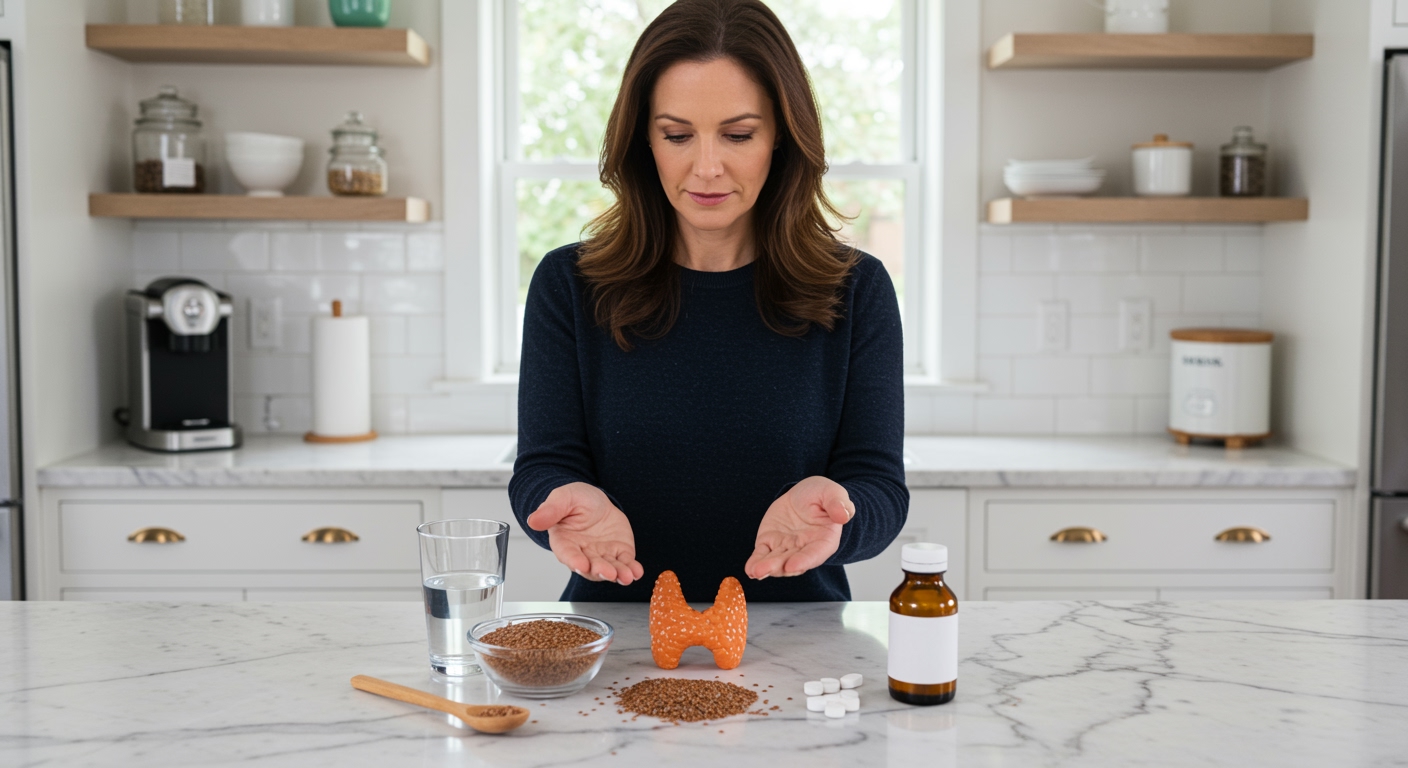✪ Key Takeaway: Flaxseeds may interfere with thyroid hormone absorption and should be consumed carefully by people with hypothyroidism.
Introduction
You scroll through health forums and see countless people claiming flaxseeds cured their thyroid problems.
You might be wondering if these tiny seeds could be the natural solution to your hypothyroidism struggles.
Hi, I’m Abdur, your nutrition coach and today I’m going to explain the complex relationship between flaxseeds and thyroid health so you can make informed decisions.
What Makes Flaxseeds Special For Thyroid Health?
Flaxseeds contain lignans, which are plant compounds that can influence hormone levels in your body.
These lignans have weak estrogenic effects that some people believe might help balance thyroid hormones.
Flaxseeds also provide omega-3 fatty acids that can reduce inflammation throughout your body, including your thyroid gland.
The fiber content in flaxseeds might help your digestive system work better, which is important for nutrient absorption.
However, the science behind these benefits is not as straightforward as many health websites claim.
✪ Fact: Flaxseeds contain up to 800 times more lignans than other plant foods, making them the richest dietary source.
Do Flaxseeds Actually Help Hypothyroidism?
The research on flaxseeds and hypothyroidism shows mixed results that might surprise you.
Some studies suggest that flaxseed lignans could help reduce thyroid antibodies in people with autoimmune thyroid conditions.
However, other research indicates that flaxseeds might actually interfere with thyroid hormone production in certain situations.
The goitrogenic compounds in flaxseeds can potentially block iodine uptake by your thyroid gland.
This means that while flaxseeds might help some people, they could make hypothyroidism worse for others.
Your individual response depends on factors like your iodine status, medication timing, and overall thyroid function.
✪ Note: Goitrogenic effects are typically only significant when consuming large amounts of raw flaxseeds regularly.
Can Flaxseeds Interfere With Thyroid Medication?
This is where things get really important for people taking thyroid medication like levothyroxine.
Flaxseeds are high in fiber, which can bind to thyroid hormones in your digestive system.
When fiber binds to your medication, less of the active hormone gets absorbed into your bloodstream.
This means your thyroid medication becomes less effective, potentially leaving you with symptoms of hypothyroidism.
The timing of when you consume flaxseeds matters significantly for medication absorption.
Most doctors recommend waiting at least four hours after taking thyroid medication before consuming high-fiber foods like flaxseeds.
✪ Pro Tip: Always take thyroid medication on an empty stomach and wait before consuming any high-fiber foods or supplements.
What Is The Safe Way To Use Flaxseeds With Hypothyroidism?
If you want to include flaxseeds in your diet while managing hypothyroidism, moderation is key.
Start with small amounts like one tablespoon of ground flaxseeds per day to see how your body responds.
Always consume flaxseeds ground rather than whole, as your body cannot digest the tough outer shell of whole seeds.
Time your flaxseed consumption at least four hours away from your thyroid medication to avoid absorption issues.
Monitor your thyroid levels regularly with blood tests if you decide to add flaxseeds to your routine.
Work with your healthcare provider to adjust medication dosages if needed based on your lab results.
Remember that consistency in your diet helps maintain stable thyroid hormone levels.
✪ Pro Tip: Store ground flaxseeds in the refrigerator and use within a few weeks to prevent rancidity.
The Bottom Line
Flaxseeds are not a magic cure for hypothyroidism, despite what many online sources claim.
Small amounts of flaxseeds can be part of a healthy diet, but they should never replace proper medical treatment for thyroid conditions.
I would love to hear about your experiences with flaxseeds and thyroid health in the comments below.
References
At NutritionCrown, we use quality and credible sources to ensure our content is accurate and trustworthy. Below are the sources referenced in writing this article:





